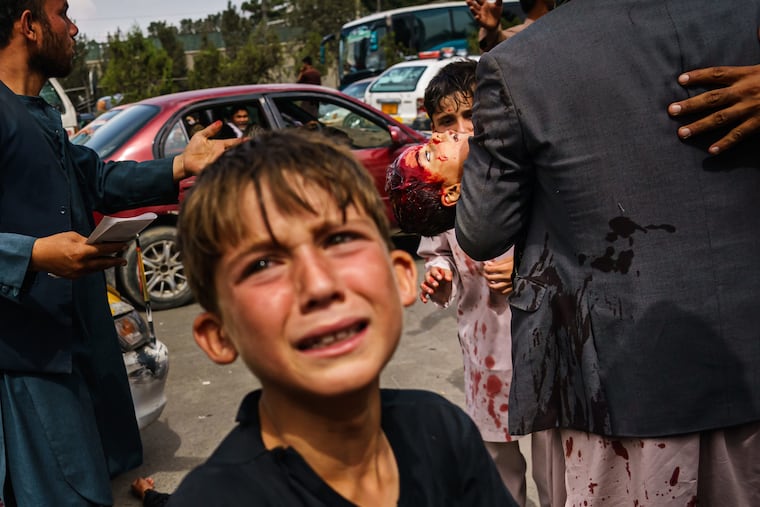We’ve betrayed tens of thousands of Afghans who helped us and are under Taliban threat
The U.S. simplified the visa process so Ukrainians could escape the Russian invasion. So how can we do less for endangered Afghans who helped our officials and troops?

It has been almost one year since the ugly U.S. departure from Kabul. Yet tens of thousands of Afghans who were promised special immigrant visas (SIVs) — meant for those who worked for U.S. soldiers and civilians — remain trapped under Taliban rule.
As the United States (rightly) rolls back bureaucratic red tape to welcome Ukrainians as temporary refugees, it is shameful to abandon those Afghans to whom we made promises.
“We left far too many behind,” I was told by Rep. Seth Moulton (D., Mass.), a veteran of the Iraq War, who has been at the forefront of pushing for legislation to speed up the SIV process. “It is taking far too long to save people who are depending on us.”
» READ MORE: As U.S. tightens visa rules, thousands of Afghan allies at risk with no hope of departing.
Contrary to popular belief, many of the roughly 120,000 Afghans evacuated from Kabul Airport during the chaotic U.S. exit were not those who were promised SIVs. Large numbers of them were people who managed to push their way into the airport or had connections with the U.S. or Afghan military inside the airport.
Other lucky Afghans were rescued by impromptu operations organized by networks of U.S. humanitarians, journalists, and U.S. military veterans, who worked to get their staff or translators through Taliban and U.S. military checkpoints and into the airport.
To revisit those desperate days in August, I highly recommend the forthcoming book The Fifth Act: America’s End in Afghanistan, due out Aug. 9. Its author, Elliot Ackerman, a decorated veteran of five tours in Iraq and Afghanistan, was drawn into one of those rescue networks. He brilliantly describes the harrowing rescue efforts, which he ties into the larger tragedy of the Afghan War.
“Everyone scrambled to get out people they knew,” Ackerman told me last week, referring to operations by U.S. veterans.
“The people who got out had the right contact list on their cell phone,” he added. “U.S. military veterans were being asked to play a Schindler’s List game, deciding who gets help and who gets left behind.”
Betraying the SIV applicants, says Ackerman, is a “betrayal of our values. We could expedite the visa process. But the administration just wants the SIVs to go away, allowing infinitesimal numbers in.”
The numbers certainly support that conclusion.
The State Department estimates as many as 160,000 Afghan allies along with immediate family members are eligible for SIVs, according to a Politico report. The eligible group includes military translators, left-behind embassy staff, staff for USAID projects, and techies who helped U.S. contractors. It doesn’t include the many thousands more judges, prosecutors, women’s rights activists, and journalists who worked on U.S.-funded projects but aren’t eligible for the SIVs.
Yet State Department flights — which the Taliban still allow to depart from Kabul Airport — evacuate only around 350 Afghans weekly; all evacuees must have SIV applications that are in the final stages of processing. They are flown to Doha in Qatar for the last crosschecks before admission to the United States.
Given the glacial pace of the process, most eligible Afghans are likely to wait years to receive a visa - or never even get one. Hunted by name by the Taliban, many applicants may be dead or imprisoned long before their number comes up.
One example: a family I’ve been trying to help who is headed by a leading Afghan judge with stellar credentials and a recommendation by a U.S. general he worked with. The general’s support has not accelerated his case.
The Taliban is searching for the jurist, so he and his family are living in hiding, the children unable to go to school, and the family fearful even to go outside to shop for food. Their money is running out. Three family members are SIV-eligible, including a women’s rights activist, yet they are only at the beginning of the visa process. The family is in such danger that I cannot use their names.
» READ MORE: We made promises to save our Afghan allies in danger from Taliban threats.
Another option that should be available to the jurist’s family — one which is now being used to expedite the arrival of Ukrainian refugees — is humanitarian parole status, which waives normal visa requirements and allows a temporary stay in the United States. Under this option, Ukrainians fleeing the Russian invasion can remain in the U.S. for two years if sponsored by relatives or other U.S. citizens.
“In the Ukrainian case,” I was told by Adam Bates, a lawyer with the International Refugee Assistance Project, “the administration did workarounds to let previously unknown Ukrainians enter in weeks. Why not let known Afghans in?” If sponsors are needed, many U.S. veterans or other volunteers could be found to host the Afghan while they waited for SIV approvals.
Yet according to Moulton, of around 45,000 Afghan applications for humanitarian parole, 2,500 have been considered and denied, and only around 270 conditionally approved.
The different treatment of Ukrainians and Afghans can’t be simply attributed to red tape.
True, there is a pressing need to simplify the overly complex SIV process, and to increase the number of U.S. personnel working on cases. But nothing will truly change without specific political direction from the White House.
“When you look at how fast the Ukrainian situation was put in operation,” said Bates, “I don’t know how you can justify the Afghan situation. There is a lack of political will from the White House to get this done.”
“The Ukrainian situation shows what happens when the administration is truly committed to processing admissions,” Bates added. “Where there is a will, there is a way.”